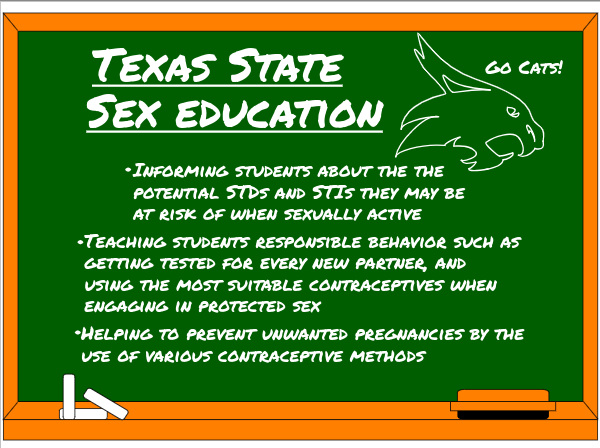Texas State should implement a required sexual education course or training module for incoming students.
It is ideal that students come into their college careers with proper knowledge of sexual health, but school districts fail to educate young teens on the topic. Sex is not an easy topic for families to talk about and many guardians do not feel comfortable having “the talk.” As a result, the lack of sex education puts college students at a greater risk of contracting STIs during the most adventurous years of their lives.
Sex education should be enforced at Texas State either through the University Seminar course or online in addition to the alcohol awareness and sexual harassment prevention modules required for incoming students. It would be a great benefit for students because it would make them more cautious during their decision-making in sexual situations.
Being aware of diseases and infections causes young adults to be alert when they are put in circumstances where they are deciding whether they should use protection or let it slide. They will be more likely to think twice.
Also, pregnancy scares are one of the worst things a young adult can experience when they are not ready to carry and/or raise a child. College is a crucial time period in life that a child would greatly interfere with. It would not be impossible to take on, but getting pregnant at a young age can be a difficult experience to get through for some people.
A sex education course could prevent unwanted pregnancies by informing students of all possible methods of contraceptives. Being educated on the benefits and side effects of contraceptives would help students decide which method is best for them if they do decide to use contraceptives.
Memes and posts are tweeted and published daily glorifying unprotected sex. This is troubling because statistics state 1 in 2 sexually active adults will contract an STI by the time they are 25 years old. This is extremely important to keep in mind, especially since the average age most students graduate at is not far from 25.
A required sex-ed course or module should show photographs of STIs and have lists of the symptoms all sexually transmitted diseases and infections have. These sources would serve as reminders of what could occur if precautions aren’t taken. If students were questioning any unfamiliar feelings after a sexual encounter, they could look to what they learned to help figure out the issue before getting tested if symptoms happen.
Although some STIs do show signs and symptoms, it should also be noted that a few major STIs do not show any. For that reason, the importance of getting tested should be stressed.
The majority of students do not keep up with their sexual health and this puts other students they have sexual encounters with at risk. On February 6, Texas State had free HIV testing for Black History Month, but the number of students that didn’t participate or know about this was alarming. The turnout was very low, and unfortunately this was not a surprise due to Texas State’s lack of sexual education.
Students should be taught to get tested if they gain a new partner and aren’t protected or if they have a partner who didn’t previously use protection. While sex education mainly focuses on physical health, mental health is also affected during intimate activity and that should not be ignored either.
A sex-ed course would encourage students to prioritize their sexual health. Acknowledging the consequences of not caring about this matter would push students to stay on top of their sexual health.
– Kindalynn Ortega is a psychology freshman
College students need more sex education
March 8, 2019

Illustration by Joshua Imagbe.
Donate to The University Star
Your donation will support the student journalists of Texas State University. Your contribution will allow us to purchase equipment and cover our annual website hosting costs.
























